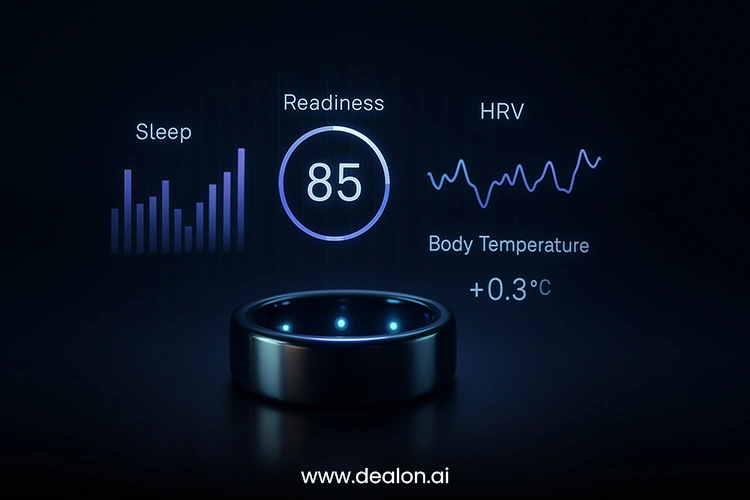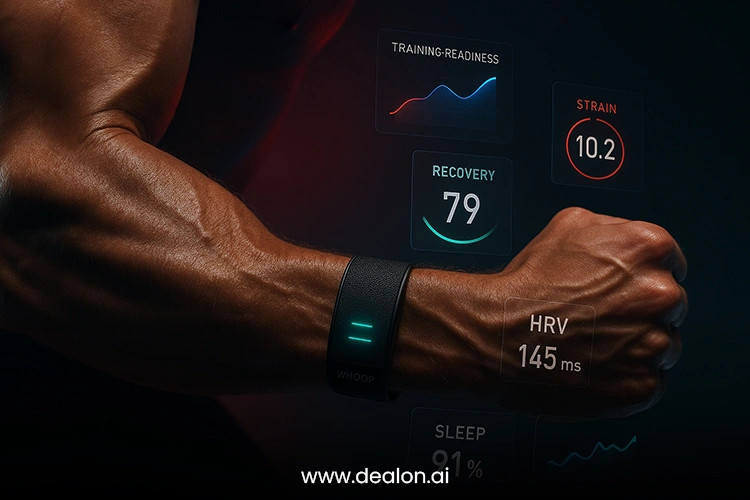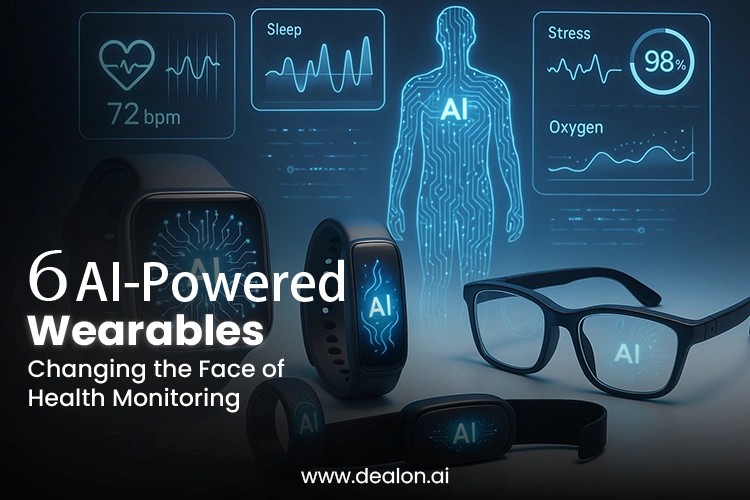Over recent years, the long-anticipated convergence of the artificial intelligence (AI) and wearable technology industries has brought a revolution in the health monitoring world. Wearables powered by AI are changing how we perceive our health care by providing more from the real-time insights, predictive and personalized recommendations previously exclusive to medical experts.
It is no longer the time of mere ability to count steps or monitor heart rate; now, AI-powered wearables can provide advanced capabilities that can diagnose the onset of diseases, identify optimal well-being measures, and even save their lives. Whether you can assess heart rate variability or detect a seizure and optimise sleep patterns, these wearables indicate a more profound and more comprehensive picture of a person and their health.
The introduction of these smart devices is an essential transition in the sphere of preventative medicine, as it allows people to gather information to make decisions based on actual data, avoid developing chronic conditions, and raise their overall quality of life.
The presence of machine learning algorithms also enables wearables to be constantly updated in terms of learning more information on their users based on their health habits, and become increasingly aware of the trends of their habits and health. Such flexibility allows ensuring that every wearer will be provided with more and more specific recommendations, proposing to change exercise regimens, suggesting a change of diet, or notifying about medication use.
In addition, through wearables powered by AI, healthcare is being democratized, meaning that individuals will have access to the rich health metrics, which previously did not leave the clinical realm. These devices help people control stress, anticipate possible cardiovascular events, and take active control of their health in a way that was not possible before. And with the further development of AI technology, wearables will continue to get broader and more advanced, offering more intricate and personalized healthcare solutions, which will eventually become part of the everyday routine. Wearable is the future of health monitoring, and it is driven by the smartness of AI.
Also Read: 8 AI-Driven Data Benefits of Teleworking and Virtual Teams
1. Apple Watch Series 8: The Epitome of Smart Health Monitoring

This is the latest advancement in AI wearable technology, whose purpose is to provide a standard health watch. It is easily connected to iOS devices and promotes a complex continuum of interaction that allows individuals to take more control over their health than ever before due to sheer accuracy. The Series 8 comes with innovative AI-powered sensors that not only measure conventional parameters, such as heart rate and sleep, but also give an idea about more complicated parameters of the human organism, as blood oxygen saturation.
The capacity to constantly take note of vital signs makes Apple Watch a central device that actively supports health management, stretching way beyond what fitness trackers are generally capable of doing.
The ECG app is one of the key characteristics of the Series 8, which is a sophisticated app that detects the early symptoms of atrial fibrillation (AFib), a rather dangerous heart illness. Using sophisticated machine learning technologies, the watch analyses data about the heart rhythm in real-time, providing early warnings that can trigger appropriate human action to address the issue. This forecasting power is the best example of how AI is influencing the space of individualized care, which allows users to take a proactive course of action prior to the development of minor anomalies into serious health challenges.
Besides the cardiovascular features, the introduction of temperature sensing is a ground-breaking improvement to the Series 8, which could benefit the health of women by helping monitor the monthly cycle and provide pregnancy reports. Using its cycle tracking and ovulation prediction features, the watch transforms into a universal reproductive health management tool, giving precision and convenience previously restricted to medical equipment.
This is not just another smartwatch, thanks to the use of powerful AI-based algorithms in combination with brilliant hardware sensors. It is an interactive health adjunct, and it can adapt itself indefinitely as it learns more about the user. The combination of AI, machine learning, and health-centered capabilities contributes to the Apple Watch Series 8 being an irreplaceable contribution to the emergent healthcare wearable sphere.
2. Oura Ring: A Compact Wearable with Comprehensive Health Insights

Oura Ring is a pioneer in the field of wearables driven by AI, and presents a classy but powerful way to monitor health in a very minimalist way. The Oura Ring is more streamlined and inconspicuous than going to the gym with the standard wearable devices on your wrist; on the contrary, it provides an abundance of health information in a very matter-of-fact manner. Even though unsightly, the ring has sophisticated AI-based sensors that observe a broad spectrum of biological parameters, including sleep levels, temperature changes, etc., and the user has constant, real-time data on their health conditions.
The main feature of Oura functionality is its Readiness Score, which is an AI-based metric used to show you how prepared your body is to face the day. Some of the aspects considered in this score include: the quality of sleep, the heart rate variability (HRV), and your activity levels, which are then combined in a single evaluation of your physical readiness. Having embedded machine learning algorithms, the Oura Ring searches patterns over time. It offers personal feedback on how users should optimize their health, aspects such as recovery, sleep improvement, and stress management.
Sleep tracking features of the Oura Ring are awe-inspiring. The device applies AI in measuring sleep architecture, analyzing the amount of time spent on different states of sleep, including deep sleep, REM sleep, and light sleep. That information enables Oura to provide the user with specific ideas about enhancing sleep, so that they can maximize the healing process and improve the user’s cognitive performance. The point of departure with the Oura Ring is that it gives an individual a sense of monitoring their health without being too obsessive to give out updates every time.
It is a good option with continuous and passive tracking and is recommended for people who want an intelligent and low-maintenance tracker. Regardless of whether you want to become physically fitter, achieve mental clarity, or be a healthier person in general, the Oura Ring was designed as an inconspicuous yet handy health companion. The fact that the Oura Ring is comprehensively made using top AI, machine learning, and discreet design makes it a current claimant in the subject of wearable health technology.
3. Fitbit Sense 2: AI-Powered Wellness in the Palm of Your Hand
The Fitbit Sense 2 is a big step in the future of wearable health technology, combining innovative AI features with a completely end-to-end approach to wellness and fitness in a single wearable fitness tracker. As an avenue of athletic precision, Fitbit has been exquisite at fitness tracking, and now with the Sense 2, it has reached higher levels of understanding of the human heart, stress indicators, heart rhythm, and more by going beyond counting steps and calories burned.
The heart rate monitoring feature of the Sense 2 is enabled by the application of artificial intelligence that follows a user continuously, taking their pulse and pinpointing possible irregularities or anomalies. This makes the device an early warning system against cardiovascular problems so that the users can consult medical assistance at the right time before the minor concerns lead to serious health problems.
It is also revolutionary to integrate stress management technologies; through AI algorithms, the Sense 2 can process physiological data such as skin temperature changes and heart rate variability (HRV) to give you real-time analysis of how stressed you are and good tips to start stress management and increase clarity of mind.
The feature of the skin temperature monitoring in the Fitbit Sense 2 is an innovation that changes the game in primary illness identification. With frequent monitoring of minor variations to the temperature of the skin, the device will be able to warn of the beginning of a fever or other signs of an illness days before it can be observed otherwise. This prediction ability can make its user proactive towards their health, starting with changing their daily routines along with the decision to consult with a medical professional.
Besides these health facts, Sense 2 will present a round wellness package, delivering detailed sleep analysis and physical activity. The smart watch provides detailed sleep data, which enables users to optimize their sleep and rest time to ensure better wellness. Applying Google Assistant integration, the Sense 2 simplifies health management, making it hands-free, allowing any tasks to be performed using voice commands.
4. Whoop Strap 4.0: Advanced Performance Monitoring for Athletes

The Whoop Strap 4.0 will be an AI-enabled wearable that will revolutionize how athletes and other fitness enthusiasts monitor their performance to complete their workouts and improve their routines. Unlike conventional wearables, which are mainly concerned with simple parameters, such as steps or calories burned, the Whoop Strap 4.0 gives an in-depth insight into the biometric data of athletes, revealing complete information about their recovery status, strain, and sleep quality. It is a valuable device for all serious athletes who intend to push their physical limits but also avoid overtraining and burnout situations.
The Whoop Strap 4.0 stands out among other traditional wearables because it has no screen, instead being designed to prioritize the ease of usage, aiming at the user insights that the tracking device can generate. There is no real-time visual information provided by the strap, which delivers its results to users through a special application; here, users will be able to find their detailed performance statistics. This practice allows athletes to monitor some important physiological parameters, including heart rate variability (HRV), which is critical to learn more about the autonomic nervous system and the recovery rate of their bodies.
Using AI-powered algorithms, the Whoop Strap 4.0 will compute a Recovery Score that tells athletes when they are ready to train. Such real-time data is priceless in regards to helping avoid overtraining, which is a problem that is commonplace among elite athletes, and this is possible since such data offers individualized understanding about the healthiness of the body in terms of additional exertion. It considers such factors as the quality of sleep, strain, and former intensity of workout, so that the device could provide personal recommendations on the volume of training and rest times to the users.
5. Biostrap EVO: A Comprehensive Health Monitoring Solution
Biostrap EVO is an innovative AI-powered wearable gadget that offers an integrated solution to health monitoring. In contrast to the simple fitness trackers, the Biostrap EVO provides customers with a detailed insight into their physical health condition, and not only counts steps but also heartbeats. It is precisely designed to cater to the needs of individuals who want to achieve higher knowledge about their well-being data, including the quality of sleep, heart rate variability (HRV), and overall recovery.
The device incorporates AI algorithms, which process the received information, providing a user with the calculated personal Physiology Score, which can give a precise indication of the current health situation and the possibility of engaging in an active exercise.
The Biostrap EVO boasts one outstanding characteristic of the advanced sleep tracking feature, as it has an excellent capability of counting the various stages of sleep. Monitoring these sleep stages, the Biostrap EVO gives practical recommendations on the condition of recovery and enables the user to optimize rest and, thus, increase their sleep hygiene. It is an essential aspect for such sports persons and other people who want to treat their bodies and minds after strenuous activities or following busy days.
The Biostrap EVO is especially innovative in that it measures heart rate variability (HRV), which is a critical biomarker of stress and recovery. Monitoring HRV all the time, this device gives real-time data, enabling the users to learn how their body is responding to stress and physical activity. This can thus affect more accurate changes of training intensity and rest, and lead to long-term fitness improvements because overtraining is avoided.
A bio strap EVO is also integrated into smart devices since it can synchronize perfectly with other health-related technologies and applications. This interoperability improves the whole experience of the user and allows people to control and maximize their wellness with a common platform. No matter whether you want to comprehend the quality of sleep, track a recovery process, or analyze whether your body is ready to engage in physical activities, the Biostrap EVO is a super-functional, AI-guided device designed to assist people in taking care of their well-being.
6. Garmin Venu 2: AI-Enhanced Fitness and Health Tracking
Garmin Venu 2 is a wearable of higher order with the power of artificial intelligence that perfectly coincides with the process of fitness tracking, with complex health monitoring, being an ideal device that could lead a person to the best shape and well-being. This wearable high-tech watch is more than a fitness tracker as it provides the complete picture of the health state of an individual, with a particular focus on the state of the heart, sleep efficiency, and vitality during the day.
Among the outstanding qualities of the Venu 2, its pulse oxygen sensor is included, which measures the level of oxygen saturation in the blood. This statistic is priceless in people with respiratory disorders, where the instantaneous number of oxygen in the blood is vital in modulating activity and comprehending how the organism is coping with exercise or sleep. It is also beneficial to people who are involved in sports activities at high altitude, or those who have VD, such as sleep apnea.
Also, the stress tracking feature is supported by AI algorithms that monitor physiological data in order to find out the stress levels of the user. With the Body Battery feature in the Garmin Venu 2, you can get information in terms of energy reserves so you can visually see the amount of energy you have during each part of the day. With this information, users can intelligently organize how to engage in physical and mental labor and rest in moderation in order to prevent work burnout. The second field that is successful in the Garmin Venu 2 is sleep tracking.
By using the AI technology, it thoroughly examines sleep patterns, including the light, deep, and REM sleep, and suggests how to improve the quality of sleep to be able to provide the user with individual guidance. This information will be crucially needed by individuals attempting to maximize recovery and increase their thinking abilities. In athlete terms, the Venu 2 has fitted in various workout tracking and GPS features that make sure the user tracks performance levels as they go along in the workout, whether running, cycling, or even participating in other physical activities. Owing to these extensive functionalities, the Garmin Venu 2 is an outstanding device to maximize healthcare and fitness activities.
Conclusion
Wearables powered by AI are helping us keep a check on and be in control of our health in real-time, and they not only track us but also provide insights personally. Other devices such as the Oura Ring, the Fitbit Sense 2, the Whoop Strap 4.0, the Apple Watch Series 8, the Biostrap EVO, the Garmin Venu 2, and the Embrace2 by Empatica are establishing new standards in health technology because of their enhanced capabilities.
These introduced features include reporting predictive health alerts, stress management, sleep optimization, and seizure detection. Such wearables are taking the field of personal wellness and, at the same time, transforming proactive health care by giving people more of the reins in wellness and health monitoring and changing the future of health monitoring.

